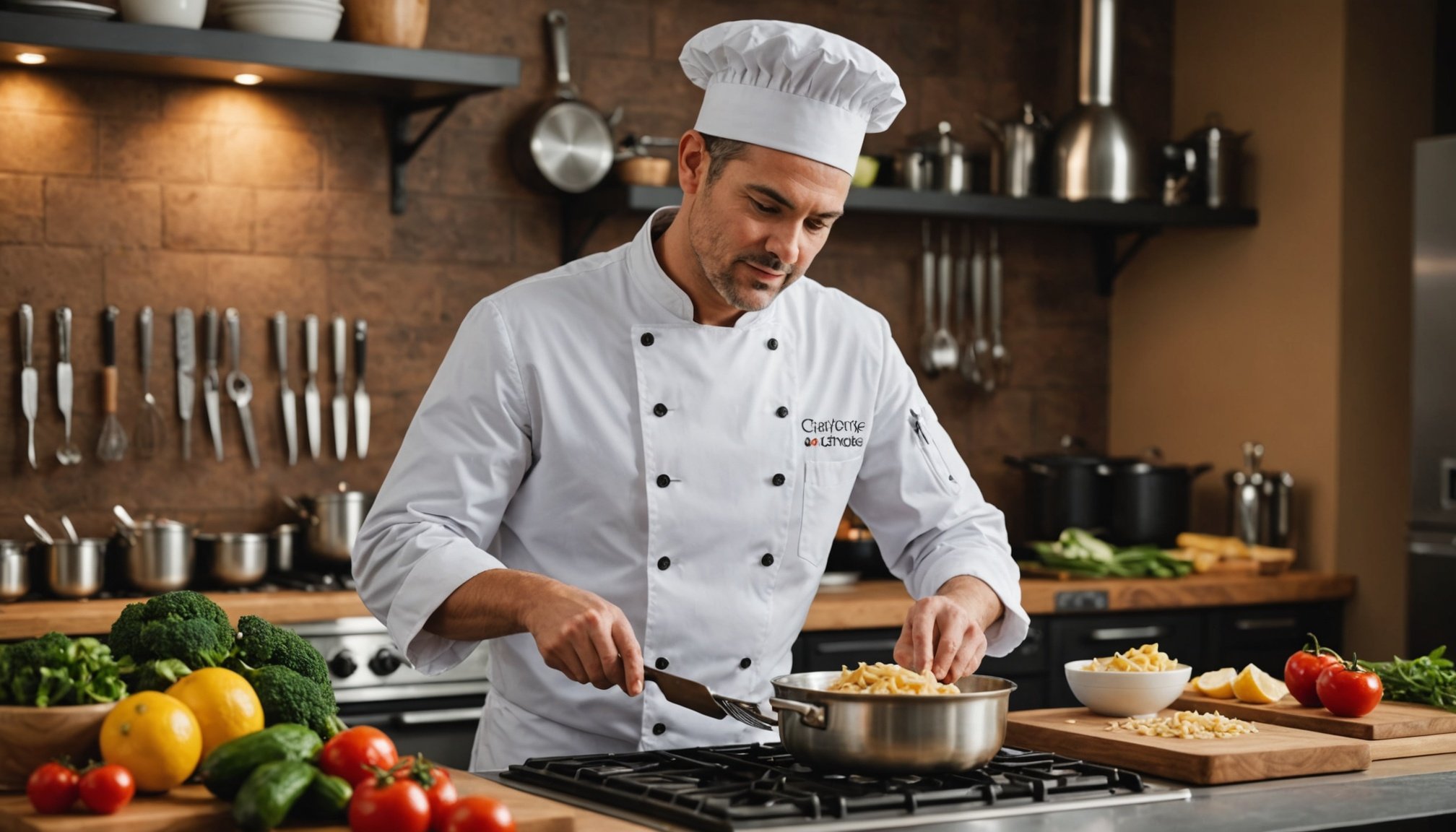Advanced Cooking Techniques
Advanced cooking techniques significantly elevate one’s culinary skills and experience. They aren’t just about culinary flair but result in profound transformations in cooking mastery. Techniques like sous vide or molecular gastronomy, for example, allow for precise control over temperatures and textures, leading to exceptional results. Before exploring these, mastering foundational skills such as knife handling and temperature control is essential. These skills lay the groundwork for more complex endeavors.
Proper integration of advanced methods into everyday cooking begins with regular practice of these foundational skills. As you gain confidence, start incorporating one advanced technique at a time.
Topic to read : How can you prepare a delicious steak and kidney pie?
Consider these steps:
- Begin with the basics: Understand the underlying principles driving the technique.
- Practice frequent experimentation: Try out variations and adaptations of recipes.
- Stay patient: Mastery takes consistent effort and time.
To truly embrace culinary skills advancement, it’s crucial to stay curious and embrace continuous learning. Venturing slowly into the world of advanced cooking techniques ensures gradual and sustainable improvement. Each new skill promises the excitement of uncovering novel culinary results, transforming ordinary meals into gourmet experiences.
This might interest you : Essential Culinary Delights for Sustainable Development: A Must-Taste Guide
Essential Culinary Skills
Cultivating essential cooking skills lays the groundwork for enhanced culinary outcomes. Just like a musician needs to master scales before composing a symphony, a cook must first become adept in foundational techniques. This mastery is achieved through regular practice and focused effort.
Key skills include:
- Knife Skills: Understanding knife cuts and safety ensures precision and efficiency in preparation.
- Mise en Place: Organizing ingredients beforehand streamlines the cooking process, preventing errors and saving time.
- Temperature Control: Mastering heat levels is crucial for achieving desired textures and flavors.
Practicing these skills can involve setting time aside to experiment with different knife techniques or temperatures. Joining workshops or watching tutorial videos can further bolster understanding.
Mise en place, translating to “everything in its place,” plays a pivotal role. It encourages planning and readiness, reducing stress and promoting a professional environment. This discipline not only enhances efficiency but significantly impacts the quality of the meal outcome.
As foundational techniques become second nature, they serve as a springboard into more advanced culinary pursuits, turning ordinary dishes into a canvas for creative expression. By investing in essential skills, any cook can elevate their cooking mastery substantially.
Mastering Various Cuisines
Exploring and mastering different cuisines enriches one’s culinary diversity and enhances overall cooking mastery. Each cuisine offers unique techniques, flavours, and cultural contexts that contribute to a cook’s repertoire.
Italian Cuisine Techniques
To excel in Italian cuisine, focus on mastering simple yet impactful recipes. Pasta making is fundamental, from preparing dough to perfecting sauces like marinara or carbonara. Mastery of risotto requires attention to texture, ensuring the rice achieves the perfect al dente consistency. Embrace the use of fresh ingredients like basil and parmesan to enhance your dishes’ authentic taste.
Asian Cuisine Techniques
In Asian cooking, knife skills are paramount, with precise slicing and dicing bringing out the essence of ingredients. Techniques like stir-frying demand high heat and swift movements, ensuring food retains its vibrancy and flavour. Understanding the balance of sweet, sour, salty, and umami flavours characterises Asian culinary skills and enriches your palate experiences.
French Cuisine Techniques
French cuisine is renowned for its elegance in presentation and technique. Mastering fundamentals such as sautéing, braising, and making béchamel sauce lays the groundwork for more complex dishes like coq au vin. Precision and patience are key, as French cooking focuses heavily on technique, transforming meals into culinary art.
Innovative Cooking Methods
Exploring innovative cooking methods can dramatically expand your culinary repertoire. Methods such as sous vide offer unrivalled benefits in achieving precision in cooking. By vacuum-sealing food in a bag and cooking it to an exact temperature in a water bath, this technique ensures even cooking and enhanced flavour.
Molecular gastronomy exemplifies modern techniques that revolutionise the way we perceive food, introducing a blend of science with culinary creativity. It involves manipulating ingredients on a molecular level, allowing creations like foams or spheres that hold unexpected textures and flavours. It’s an exciting field that challenges traditional cooking norms and encourages experimentation.
Another aspect of creative cooking involves the use of smoke and fire. Cooks can enhance flavours and presentations uniquely. Smoking introduces rich, deep notes, while techniques like grilling or torching add a delightful char, lending depth to your dishes. These methods not only stimulate the palate but also offer aesthetic appeal.
Integrating these modern techniques into your cooking practice encourages a fun and exploratory approach to preparing meals. Each method provides opportunities to infuse dishes with unique flavours and textures, making your culinary journey both satisfying and innovative.
Transformative Recipes
Embracing transformative recipes can be a profound way to enhance your cooking mastery. Through creative experimentation, you can turn ordinary meals into extraordinary experiences. Recipes that utilize advanced cooking techniques are a great place to start. They highlight the transformative potential of new skills, such as sous vide for perfectly cooked proteins or molecular gastronomy for unexpected textures.
For those keen on modifying traditional recipes, consider replacing conventional cooking methods with more innovative approaches. For instance, switching from boiling to sous vide can not only improve texture but also boost flavours by retaining essential aromas.
Experimentation is key when it comes to demonstrating your culinary skills. This may involve combining elements from different cuisines or introducing new ingredients. The goal is to push boundaries while staying true to fundamental culinary principles. Creativity should not overshadow the importance of understanding techniques, but rather complement them, allowing for the development of unique recipes.
When venturing into creative cooking, remember the importance of maintaining the integrity of flavours and textures, leading to dishes that are both delicious and innovative. Through this approach, transformative recipes can elevate everyday cooking into a form of art.
Visual and Video Guides
Embracing visual and video guides significantly enhances hands-on learning in the culinary world. These resources provide step-by-step demonstrations, making complex processes more accessible. When encountering a challenging technique, asking “How can I best learn this?” leads us directly to the precision benefits of visual aids. Watching experienced chefs breaks down barriers, offering clarity that often surpasses text-based instructions.
Video tutorials come with visual cues like how ingredients should look at each stage, crucial for mastering advanced cooking techniques. These tutorials are abundant online, accommodating various levels of cooking mastery, from essential skills to innovative methods. Platforms hosting these guides often include interactive elements, such as comments and feedback, enhancing engagement and learning.
To maximize the potential of these resources, consider creating a personal library of your favorite videos and guides. This curated collection serves as a ready reference, assisting in quick problem-solving and encouraging continual growth in culinary skills. Bookmarking or creating playlists can consolidate learning material, saving time and optimizing study sessions.
Incorporating these multimedia tools into your routine offers invaluable support for anyone eager to improve their proficiency in cooking, ensuring both understanding and enjoyment in the culinary journey.

